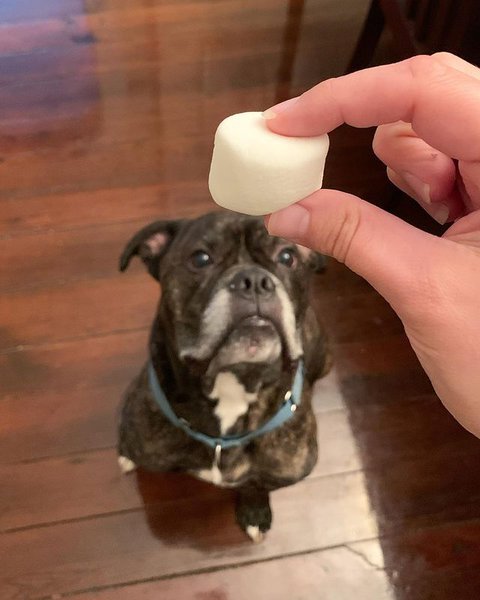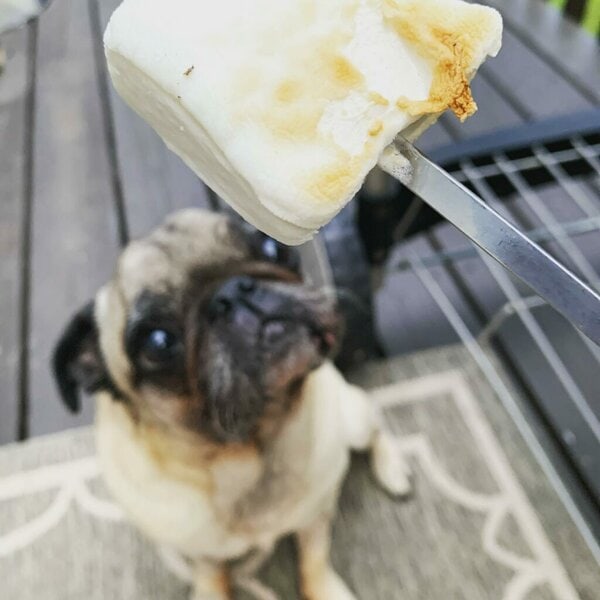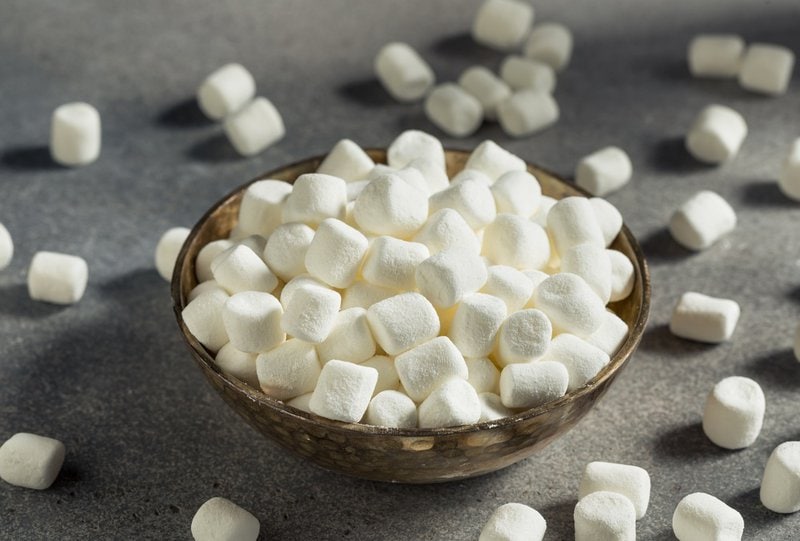Marshmallows are a sweet, yummy treat that can be hard to resist, and with the winter season approaching, many of us will indulge in the habit of somehow including marshmallows in our diets but can you include it in your dog’s diet?
Dogs cannot eat marshmallows because they are certainly not good for your furry friend’s health, even though they may not be toxic to dogs. Marshmallows are soft, chewy, and sweet, made of sugar and gelatin. They often contain a sweetener known as “Xylitol,” which is highly toxic to dogs. Marshmallows are not a healthy food to be consumed by your doggy.
If you are curious to know more about why your dog shouldn’t have marshmallows and how much is enough? Here, we will explore the possible health risks, so you can decide whether to indulge your pup!
Can I Give My Dog Marshmallows?

Yes, you can give one or two marshmallows to your dog occasionally, but more than that will only cause harm to your dog. Eating one or two marshmallows occasionally won’t hurt your dog, but marshmallows are sugar pillows, and sugar is not suitable for your pooch’s health. They do not add any nutritional value to your dog’s diet.
Marshmallows are incredibly high in sugar and calories, making them especially dangerous for dogs with diabetes and weight problems. Even if your pooch is perfectly healthy, feeding it with sugary treats can lead to obesity in the long run and further lead to diabetes.
It is okay to give your dog a marshmallow once in a while as a treat but keep in mind they will not do any good for your dog’s dietary benefits. The reasons why you should avoid feeding your puppy marshmallows are as follows:
High Sugar Content
In a 100-calorie serving of marshmallows, 97 calories come from sugar and starch (nutrients dogs don’t need), and the remaining three calories come from protein (an essential nutrient for dogs). By weight, marshmallows are about 60% sugar and 2% protein which is enough to qualify them as junk food.
Low Or Very Little Nutrients
Marshmallows contain little to no nutritional value. They add nothing to your dog’s intake of beneficial nutrients and are almost entirely made up of sugar. Feeding your dog marshmallows frequently would impose various health concerns.
Do All Marshmallows Have Xylitol?
No, not all marshmallows contain xylitol, but most of them do. Xylitol is an artificial sweetener, and it is extremely toxic to all pets. If consumed, it can be terrible for your little friend.
Even a small quantity of xylitol will adversely affect your dog’s health. The consumption of xylitol can result in various health issues, such as lethargy, trembling, and indigestion. So, if your dog has ingested a marshmallow with xylitol, even if it is just one, contact your vet and seek immediate help.
Are Jet-Puffed Marshmallows Safe For Dogs?

Jet-Puffed Marshmallows are not toxic to dogs. However, it carries a risk of choking, so it’s best to keep it out of reach of your furry friends.
If your dog swallows a marshmallow, don’t panic. Observe your dog for signs of distress and consult your veterinarian if you have any concerns.
What Are Jet-Puffed Marshmallows Made Of?
Jet-Puffed Marshmallows are made up of the following ingredients:
- Corn syrup
- Sugar
- Dextrose
- Modified cornstarch
- Water
- Contains less than 2% of gelatin
- Tetrasodium Pyrophosphate (whipping aid)
- Natural and artificial flavors
These ingredients tell that Jet-Puffed Marshmallows are made with mostly sugar and not much else. So, do your fur baby like this sugary treat? Let’s find out.
Do Dogs Like Marshmallows?
Most dogs see marshmallows as a delicious treat. It can also be because marshmallows may have a consistency similar to some dog toys. That’s because marshmallows are soft, chewy, and squishy.
Friendly reminder that no matter how much your dog seems to like marshmallows, they shouldn’t be fed some. Marshmallows are full of sugar which isn’t good for your dog, and they have no other nutritional benefits.
Can One Marshmallow Hurt A Dog?

Eating one marshmallow won’t hurt a dog unless it contains xylitol. If the marshmallow doesn’t contain xylitol as a sweetener, there isn’t anything worth panicking over.
Marshmallows aren’t exactly toxic to dogs, but they are not beneficial either. There’s only one case in which a single marshmallow could prove to be hazardous for your dog, and that is if the marshmallow contains xylitol. Marshmallows are not advised for your little furry friends because they are full of sugar, and excess sugar can harm your pup.
How Many Marshmallows Can A Dog Have?
Dogs shouldn’t be eating marshmallows. However, if your furry friend cannot resist and eats one or two marshmallows (non-xylitol type), they are likely to be okay.
Marshmallows are bad for your pooch’s health because they contain high sugar levels and add no nutritional value to their diet. Occasionally, you can give your pup one or two marshmallows as a special treat.
What Happens If A Dog Eats A Lot Of Marshmallows?
The effects of xylitol poisoning in dogs can appear soon after ingestion. If you think your dog has eaten marshmallows containing xylitol, call your veterinarian immediately.
Your veterinarian will tell you whether your dog has ingested a toxic amount of xylitol and whether it is safe to induce vomiting at home. Or determine if you need to see an emergency veterinarian. If you think your dog has eaten too many marshmallows (non-xylitol type), watch out for the following symptoms:
Diarrhea
Your pup may get diarrhea after consuming many Marshmallows. Excessive sugar can result in osmotic diarrhea by pulling the excess water out of the ingesta in the intestines. Keep an eye on them and if it lasts longer than a day or two or if you see any blood in diarrhea, contact your vet.
Stomach Upset

Eating a lot of marshmallows can result in an upset stomach. Consuming high sugar levels causes an upset stomach in dogs, so make sure you don’t leave a bag of marshmallows alone with your pup.
Lack Of Appetite
Eating an excessive amount of marshmallows may result in your dog losing its appetite. If these symptoms persist for a day or two, you need to get your pup checked by a veterinarian.
Vomiting
Marshmallows are full of sugar. Consuming excessive sugar can result in vomiting among dogs. If your dog vomits multiple times in a day or continues for more than one day, contact your vet and seek help.





